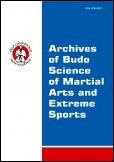2020, Volume 16, Issue 1
Training experience and weekly training total time vs. aerobic capacity and level of effective restitution of male Polish Judo National Senior Team athletes during the preparation period for the Olympic Game
Adam Prokopczyk1, Marek Sokołowski1
1Nauk o Kulturze Fizycznej, Akademia Wychowania Fizycznego im. Eugeniusza Piaseckiego w Poznaniu, Poznań, Poland
Author for correspondence: Adam Prokopczyk; Nauk o Kulturze Fizycznej, Akademia Wychowania Fizycznego im. Eugeniusza Piaseckiego w Poznaniu, Poznań, Poland; email: prokopczyk@awf.poznan.pl
Full text
Abstract
Background & Study Aim: The sport judo at the championship level contains many interconnected components, which ultimately determine the results achieved. One of these components is physiological condition, including the level of aerobic capacity and the index of effective restitution. The cognitive aim of this study was the knowledge about relationship between aerobic capacity and post-exercise restitution and the training experience, weekly training total time (which accumulates the components of the so-called training volume and exercise intensity), and body weight of the examined men, within 7 months before the planned Olympic Games in Tokyo. There were verify two hypotheses: H1) training experience improves the relative aerobic capacity of the competitors; H2) weekly training total time positive affects the level of post-exercise restitution.
General remark: unfortunately, due to the coronavirus pandemic on a global scale, the Olympic Games scheduled for 2020 were postponed to 2021.
Material & Methods: The subjects were 9 men (age 20.5 to 26.5 years) on the Polish Judo National Senior Team at a training camp early in the preparatory period. The Maximal Multistage 20-m Shuttle Run Test (Beep-Test) was used to measure aerobic capacity, and the Klonowicz index was used to determine restitution efficiency. In addition, the relative aerobic capacity, relative average running speed and relative distance covered in relation to the subjects’ body weight were determined. The training experience criterion was years of training (in this case over 15 years). Training total time was measured in hours.
Results: The both research hypotheses of this study were fully confirmed. The training experience significantly improved all relative aerobic capacity indices. There were also significant relationships between the weekly training total time of Polish National Judo Senior Team athletes and the level of effective Klonowicz restitution at 3 minutes and 5 minutes after exercise. The study showed that the higher the weekly training total time the athletes declared, the poorer the effective restitution index they had, both after 3 minutes and 5 minutes after the exercise.
Conclusions: Training experience and weekly training total time have a significant impact on aerobic capacity and post-exercise restitution. It is necessary to control and adapt training loads and to rest properly after exercise. Otherwise, overtraining could lead to a decrease in the load capacity of the athlete. In addition, relative indicators of an relating to the athlete’s body weight may help to assess adaptation to aerobic effort during the preparation period.
Key words: Olympic Games, national team, judo, capacity, Martial arts, preparatory period





